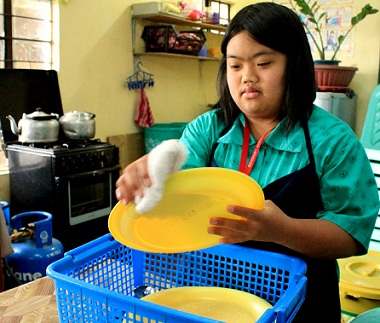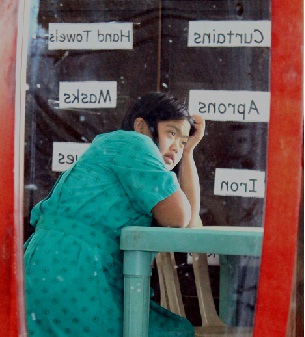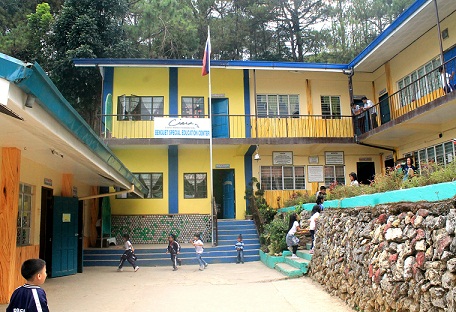Text and photos by OFELIA EMPIAN

LA TRINIDAD, Benguet—She whirls around the room with her apron on. She wipes the table clean,then stacks the yellow plastic plates, and forks and spoons in the basket.
Her teacher beams and praises her student: “Very good!”
Celina Sakiwat smiles, sits and waits for her sister to fetch her from school.
It’s a routine Sakiwat, 17, and born with Down Syndrome, has been doing for the past five years.
“She is one of the most diligent students we’ve had here,” said Violeta Santos, adviser of the Vocational Class at the Benguet Special Education (SPED) Center here where Sakiwat is enrolled.
In their class, Sakiwat is among the oldest and the only one with Down Syndrome. In a country where one in 800 children is born with the genetic condition every year, the awareness of the disability remains low. For Sakiwat’s parents, it took years before they knew what their daughter had, and many more years before they could send her to a proper special education school.
February is National Down Syndrome Consciousness Month, a time to raise awareness about the condition and promote rights of people with the disability to special care, education and services that will allow them to live decent and productive lives.
Sakiwat is the fourth child of six. Her parents are vegetable farmers in Bauko, Mountain Province who spend whatever income they get for their children’s education. At least two have graduated from college, both scholars.
It was only when Sakiwat was brought to a special school that her family found out about her exact medical condition. She had been born in their home, and when brought to the hospital, the doctors simply said Sakiwat had “inborn” abnormality.
“They never told us that she had Down syndrome and what we should do about it,” her mother Marjorie said.
Because of her delayed development, Sakiwat was able to attend school when she was already 10. For a year and a half, her teachers said while they found her to be “diligent,”she was lagging behind in class.
On top of that, Mrs. Sakiwat said: “She was bullied in school and often came home crying.” After the second grade, she quit school. For two years she stayed home, helping her parents with chores in their vegetable farm.
But, her father Sotero said, “we had to send her to school because we realized it’s not good for her not to be educated.”

It was through a neighbor that the family learned of a SPED school. So in 2009, at age 12, Sakiwat went back to school. Her brother brings her to school and her sister fetches her from class. But by next school year, Sakiwat might have to stop school in La Trinidad because of her siblings’ busy schedule.
“Sakiwat might go home to Bauko with our parents,” her sister Chona said.
Teaching special kids
The Benguet Special Education Center allows children like Sakiwat to decide whether to stay in school. “Until she likes attending our class we will accommodate her, maybe until she’s 25 years old?” Santos said.
The school has nearly 100 students and nine SPED teachers.
In the vocational class, Santos teaches basic life skills like doing chores and caring for household items. Students are taught to read road signs, danger signs in appliances, and poison warning labels.
The classes also cover skills enhancement so Sakiwat and special students like her can land a job in the future. The school will eventually recommend them to other vocational institutions for higher learning such as institutions accredited by the Technical Education and Skills Development Authority (TESDA).
A teacher since 1999, Santos said teaching students with special needs is challenging yet fulfilling. “You have to repeat what you’re teaching again and again, with patience.”
Special education teachers like her need more training programs, she said, as these would help them deal with their students’ various special needs.
“That’s why we (also)need the parents to help us care for their children,” Santos said.
The school conducts seminars for parents with special children and those with Down Syndrome, who are not physically as active.
Parents need to create an environment to make them more of a homebody, Santos added. They can also learn crafts making, baking and sewing.
Sakiwat, for example, can wash the dishes and sweep the floor. “I haven’t tested if she can care for a baby yet,” her teacher said.
Santos said children with Down Syndrome can have mood swings, an aspect of their condition that needs to be closely monitored. This and other factors could affect how they can be functional.
Although her students with the condition have never landed a regular job, Santos said SPED does help their students find work based on their ability to handle a certain jobs. “It’s good if they are employed by their own relatives who have businesses,” she said, fully aware of the intellectual barriers children like Sakiwat face.
Santos said she hopes a training center will be built someday to accommodate children with special needs until they become adults. The center will further boost their skills for their possible employment in the future.
Caring for children with disabilities
For now, when children like Sakiwat leave school, teachers won’t be able to track their progress, as there is no proper monitoring mechanism in place.
In La Trinidad, the Municipal Social Welfare and Development Office (MSWDO) said it employs “roving day care workers” who visit families with children with special needs. Of the 346 persons with disabilities (PWDs), 166 are children and 39 of them are classified with intellectual disabilities.
When Sakiwat goes home to Bauko, a four-hour drive away from here, the services will be limited. She will be counted among the 212 PWDs in her hometown, 27 of them with intellectual disabilities.

Barangay health worker Elias Bangloy said he and his colleagues monitor PWDs but the government can address only their immediate needs.
“Iyong simple lang na house visit ang ginagawa ko kung di sila makapunta sa clinic (I conduct house visits if they could not go to the barangay clinic),” he said. The barangay can provide PWDs multivitamins for common colds, vaccines for anti-flu and pneumonia and drugs to ease blood pressure problems.
Marichu Cominga of the MSWDO in Bauko also said it can only give “medical assistance and referral for assistive devices to other agencies,” due to its limited capacities to aid PWDs.
As for children with intellectual disabilities, she said the office advocates that they be sent to the SPED schools. But it is tough for the parents who can’t afford the costs, Cominga said. Besides, she added, the schools are far from their homes.
Sakiwat’s eldest sister, Charmy, however, has high hopes for her sibling. “For me, I hope she can become a dance instructor teaching kids with special needs because she’s a very good dancer.”
Charmy also described Sakiwat to be the baby in the family, obedient and loving. “If I would have my own family, I would love Sakiwat to take care of my kids,” she said. “I can picture her also taking care of my other siblings’ children.”
While it’s not yet clear what Sakiwat’s future might be, she focuses well on the present. In class, as she waited for her sister to come get her, Sakiwat opened a box of beads. Slowly, one bead at a time, she threaded them together with nylon.She was so careful, aiming for precision, that she failed to notice her sister arriving.
“Celina, enta et sumaa (let’s go home),” her sister prodded her in Kankana-ey. And like the Girl Scout that she is, the beaming Sakiwat rushed to her sister but not before putting every bead and box back to their proper places.
(This story is part of VERA Files’ Reporting on Persons with Disabilities project supported by The Asia Foundation and Australian Aid. )
